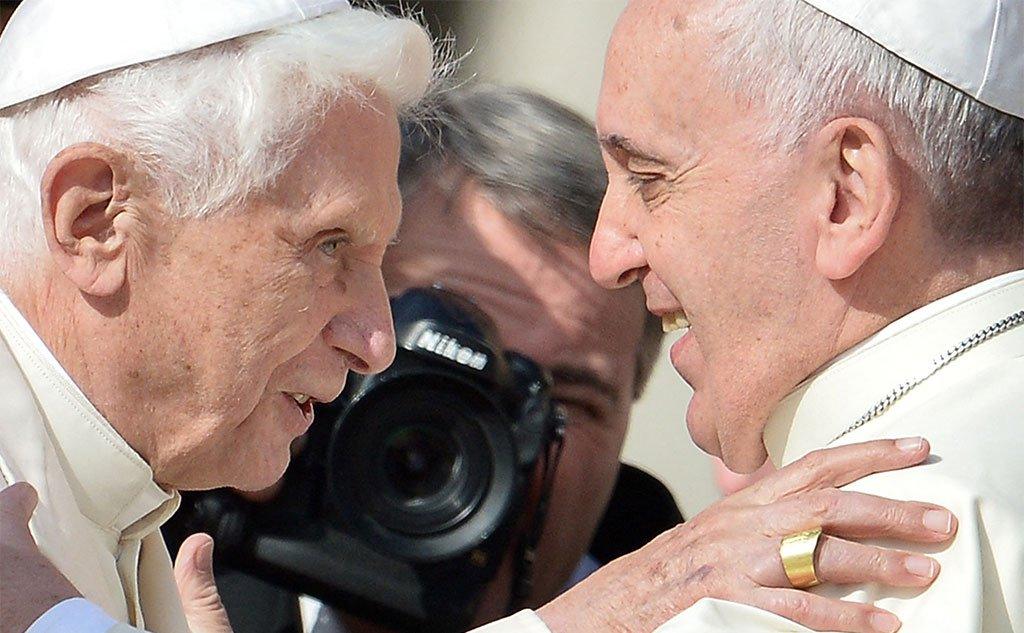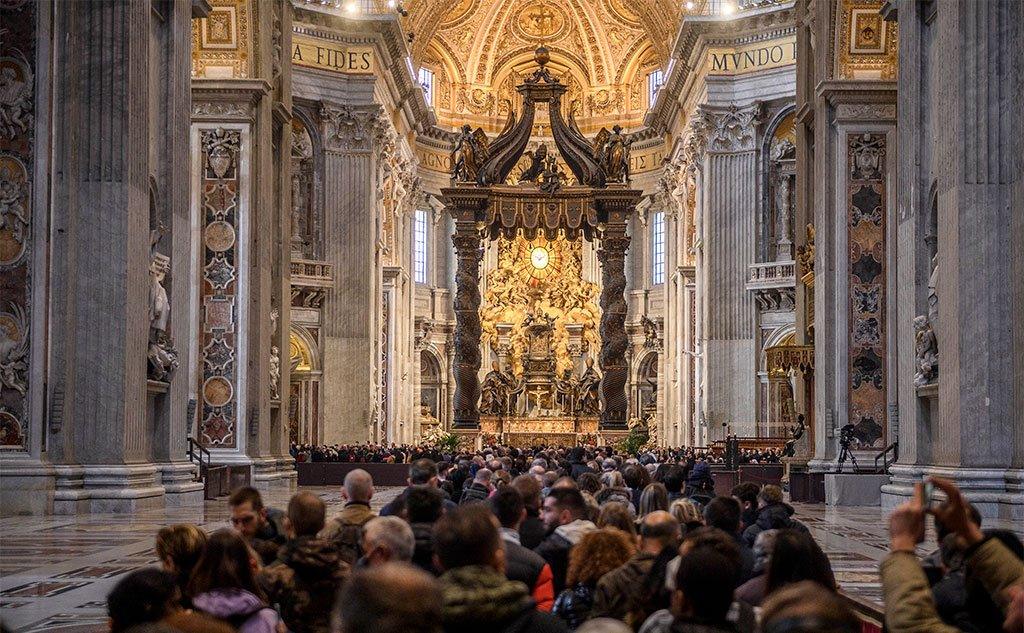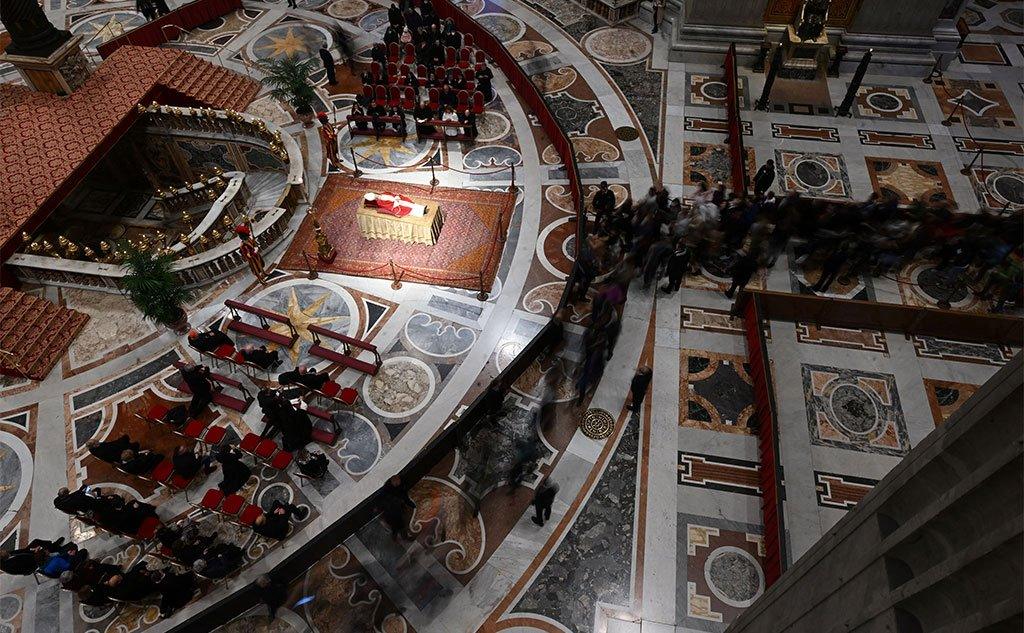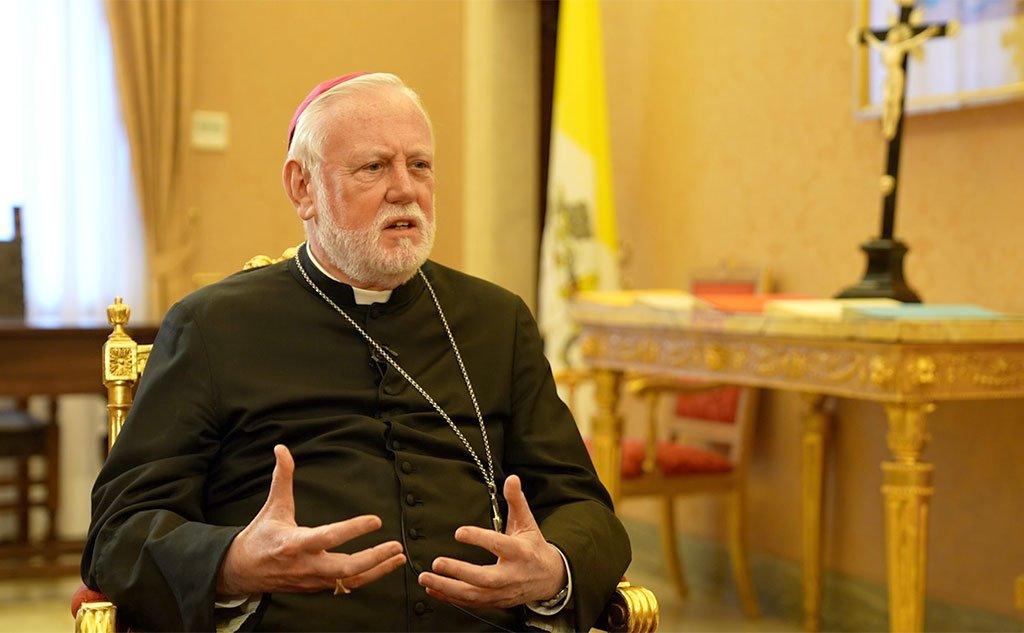Pope Benedict had 'undeniable' presence for Francis, says archbishop
- Published

Pope Emeritus Benedict XVI is welcomed by Pope Francis at St Peter's Square, Vatican, 2014
Pope Benedict was still a "powerful presence" in the Vatican despite his retirement - the most senior British figure there has told the BBC.
The comments, by Archbishop Paul Gallagher, have come as the reigning pope, Francis, makes final preparations for the unusual event of a pontiff presiding at the funeral of his predecessor.
After Thursday's burial of former pope Benedict XVI, there will be just one man wearing white in the corridors of the Vatican for the first time in nearly a decade.
It is rare for a senior Vatican figure to have spoken frankly about the relationship between the two popes.
"I think it is inevitable that the fact Pope Benedict has been living during these years of Pope Francis's pontificate - it does have an effect," said the archbishop, who has been the Vatican's foreign secretary for much of the current papacy.
"I do not think it has obstructed Pope Francis in any way. He has done and said and decided what he wanted to do, but it is a powerful presence of your predecessor," he said candidly.
In 2013, Pope Benedict became the first pope in more than 600 years to step down.
Archbishop Gallagher said that for Pope Francis, that was similar to the experience many other people go through doing a job in the shadow of a predecessor - and being compared to them.

The body of Pope Emeritus Benedict XVI lies in state ahead of his funeral
Observers of Vatican affairs during this unusual time suggest that whether Benedict courted it or not, he became something of a lightning rod for internal criticism of Pope Francis.
"Obviously there have been, in the Church, people who have looked to Benedict to contrast certain decisions that have been made by Pope Francis," said Archbishop Gallagher.
The relationship between the two popes had been excellent, said the archbishop, but critics of the current pope had tried to exploit their differences.
Over the past year, there has been much discussion here about the health of Pope Francis, who has cancelled some foreign trips on health grounds and spent most of his time in a wheelchair during other visits.
There was speculation that, although Pope Francis said he was prepared to step down if he felt he could not carry out the duties of the role in the way he would like to, he was reluctant to consider resigning while his predecessor was around.
Watch: Pope Benedict XVI through the years
His foreign secretary, Archbishop Gallagher, acknowledged that events of the past week had changed the equation to potentially allow the current Pope to consider all options more freely.
"If we had three popes, that would be a little bit difficult to manage. But now that Pope Benedict has gone to the Lord, I think that Pope Francis will stick to those principles that he has established - that he will continue in this ministry as long as he believes that he is capable," he said.
He clarified that he did not think a decision about stepping down was in any way imminent.

The body of former Pope Benedict XVI lies in state ahead of his funeral
Although the number of people who have come to pay their respects to Pope Benedict as he lies in state has far exceeded the figure the Vatican initially said it was expecting, it does not come close to the huge crowds that were drawn here in 2005 after the death of the popular Pope John Paul II.
That is partly, as Archbishop Gallagher acknowledges, because of Benedict XVI's style of papacy, being viewed as more of a thinker than a pastor or a skilled politician.
Although the archbishop said he thought the writings and theological works of the Pope Emeritus would be studied long into the future.

Archbishop Paul Gallagher
There has also been much discussion in recent days about the complicated legacy of the former pontiff, particularly the issue of inadequately dealing with sex abuse perpetrators.
"I think that the evaluation [of Benedict XVI's legacy on abuse] is obviously going to be critical, but I do believe that the election of Pope Benedict was a game changer in how the Church looked at the reality of abuse in the church," said Archbishop Gallagher, suggesting that the late Pope started initiatives that Pope Francis has since moved forward with.
"Whether enough was done at the right speed, that will be left to history and I do not think anybody here would say that we have completed the job."
Additional reporting by Harry Farley.